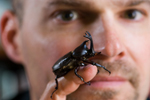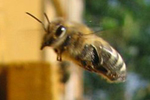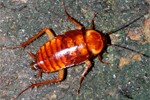New research in the Journal of Applied Ecology shows that some ground beetles help farmers in the UK by devouring weed seeds before they can sprout. The researchers say the study finds another proof of how biodiversity—the multitude of species on Earth—provides ‘free’ ecosystem services for people.
“Seed predation by naturally occurring beetles in farmland does have a beneficial effect, reducing weed numbers in fields and potentially improving agricultural productivity,” lead author Dr. David Bohan with Rothamsted Research—an organization devoted to sustainable agriculture—says in a press release.
The study looked at 257 field plots throughout the UK to study how ground beetles in the Carabidae family affect the number of weed seeds in crops such as sugar beet, maize, and rapeseed fields. The beetles had a particular impact on grass weeds, some of which have become increasingly resistant to herbicides used by farmers. Not all ground beetles are seed eaters, some also prey on insects.
Researchers recommend that beetles be used to replace some herbicide use. Farmers can encourage beetles in their land by establishing ‘beetle banks’, areas planted with species that attract wildlife—from beetles to birds—.
“We have a challenge to feed 9 billion people by 2050 and to do so we must engage in research now that will underpin improvements in yield and sustainability of farming in the future. By studying whole biological systems such as farm ecosystems we can spot the various contributions made by different aspects of a system, including these beetles,” Dr. Douglas Kell, chief executive with the UK’s Biotechnology and Biological Sciences Research Council (BBSRC), said in a press release. “This project shows that the balance of farm ecosystems can be vital to ensuring sustainability in farming in the future. It also makes the link between biodiversity and food security very clear.”
Beetles worldwide provide a number of important ecosystem services from consuming and recycling waste to keeping a check on some insect pests. Many beetle species are also an important food source for people.
CITATION: David A. Bohan, Aline Boursault,
David R. Brooks,
Sandrine Petit. National-scale regulation of the weed seedbank by carabid predators. Journal of Applied Ecology. Volume 48, Issue 4, pages 888–898, August 2011. DOI: 10.1111/j.1365-2664.2011.02008.x.
Related articles
Dung beetles: a sewage SWAT team

(06/21/2011) Biology Professor Doug Emlen speaks with Laurel Neme on her ‘The WildLife’ radio show and podcast about the biology and armaments of dung beetles. An expert on the evolution and development of bizarre shapes in insects, Emlen notes that dung beetles are one of the ‘kings’ of odd morphology.
The value of the little guy, an interview with Tyler Prize-winning entomologist May Berenbaum

(04/06/2011) May Berenbaum knows a thing or two about insects: in recognition of her lifelong work on the interactions between insects and plants, she has had a character on The X-Files named after her, received the Public Understanding of Science and Technology Award for her work in making science accessible to the public, and this year has been awarded the prestigious Tyler Environmental Prize. “Winning the Tyler Prize is an incredible honor—most of my scientific heroes have been Tyler Prize winners and I’m exceedingly grateful to be considered worthy of being included among their ranks,” Berenbaum told mongabay.com in an interview. “The Prize is also tremendously enabling—because the money is unrestricted I can use it to carry out projects that have been difficult to fund.”
Meat producers should replace cattle with insects, scientists say

(01/10/2011) Scientists in the Netherlands have discovered that insects produce significantly less greenhouse gas per kilogram of meat than cattle or pigs. Their study, published in the online journal PLoS One, suggests that a move towards insect farming could result in a more sustainable – and affordable – form of meat production.







